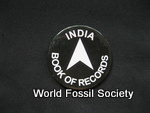Scientists from Russia’s Chechen State University claim to have unearthed at least 40 of the world’s largest “dinosaur eggs,” measuring up to 3 ft. (1 m) in diameter and dating back roughly 60 million years. Apparently, while blasting through rocks to build a road in southern Russia’s turbulent Chechnya republic, workers found a cluster of smooth, elliptical fossils embedded in the mountainside, Reuters reported.

A man looks at what is believed to be fossilized dinosaur eggs at a site in Russia’s volatile Chechnya region
The positive media attention comes as a welcome respite for Chechnya, which has endured two decades of brutal violence, thanks to two separatist wars and an Islamist insurgency. In recent years, Ramzan Kadyrov, the head of the Chechen Republic, has been pouring millions of dollars into construction, preservation and tourism projects in an effort to recast the republic’s image.
But the good news may be short-lived; skepticism among paleontologists quickly followed the announcement. “Unfortunately, it’s not true. Dinosaurs laid small eggs,” paleontologist Valentina Nazarova of the Moscow State University told Reuters, adding that the location of the find was suspicious as well. “Dinosaurs didn’t lay eggs while jumping about like mountain goats.”
“This is some kind of sand rock,” Dr. Aleksandr Averianov of the Institute of Zoology in St. Petersburg told Russia’s NTV channel. “Dinosaur eggs have a different shell structure.”
That’s not stopping Kadyrov’s government, which is considering turning the area into a nature preserve in an attempt to attract tourists to the troubled country.



 July 29th, 2012
July 29th, 2012  riffin
riffin  Posted in
Posted in 